Proteogenomic characterization of human colon and rectal cancer
- PMID: 25043054
- PMCID: PMC4249766
- DOI: 10.1038/nature13438
Proteogenomic characterization of human colon and rectal cancer
Abstract
Extensive genomic characterization of human cancers presents the problem of inference from genomic abnormalities to cancer phenotypes. To address this problem, we analysed proteomes of colon and rectal tumours characterized previously by The Cancer Genome Atlas (TCGA) and perform integrated proteogenomic analyses. Somatic variants displayed reduced protein abundance compared to germline variants. Messenger RNA transcript abundance did not reliably predict protein abundance differences between tumours. Proteomics identified five proteomic subtypes in the TCGA cohort, two of which overlapped with the TCGA 'microsatellite instability/CpG island methylation phenotype' transcriptomic subtype, but had distinct mutation, methylation and protein expression patterns associated with different clinical outcomes. Although copy number alterations showed strong cis- and trans-effects on mRNA abundance, relatively few of these extend to the protein level. Thus, proteomics data enabled prioritization of candidate driver genes. The chromosome 20q amplicon was associated with the largest global changes at both mRNA and protein levels; proteomics data highlighted potential 20q candidates, including HNF4A (hepatocyte nuclear factor 4, alpha), TOMM34 (translocase of outer mitochondrial membrane 34) and SRC (SRC proto-oncogene, non-receptor tyrosine kinase). Integrated proteogenomic analysis provides functional context to interpret genomic abnormalities and affords a new paradigm for understanding cancer biology.
Conflict of interest statement
The authors declare no competing financial interests.
Figures


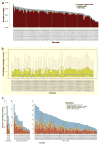
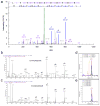
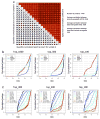
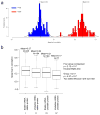

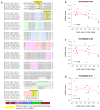

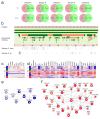



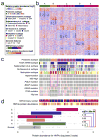
Comment in
-
Proteogenomics sheds light on tumors.Cancer Discov. 2014 Oct;4(10):1108. doi: 10.1158/2159-8290.CD-NB2014-123. Epub 2014 Aug 14. Cancer Discov. 2014. PMID: 25274663 No abstract available.
References
Publication types
MeSH terms
Substances
Grants and funding
- P50CA095103/CA/NCI NIH HHS/United States
- R01 CA046413/CA/NCI NIH HHS/United States
- GM088822/GM/NIGMS NIH HHS/United States
- R01 GM088822/GM/NIGMS NIH HHS/United States
- U24 CA160034/CA/NCI NIH HHS/United States
- U24 CA159988/CA/NCI NIH HHS/United States
- P50 CA095103/CA/NCI NIH HHS/United States
- P30 DK058404/DK/NIDDK NIH HHS/United States
- U24CA159988/CA/NCI NIH HHS/United States
- P30 CA068485/CA/NCI NIH HHS/United States
- U24 CA160019/CA/NCI NIH HHS/United States
- U54 HG003079/HG/NHGRI NIH HHS/United States
- UL1 TR000448/TR/NCATS NIH HHS/United States
- U24 CA160035/CA/NCI NIH HHS/United States
- U24CA160034/CA/NCI NIH HHS/United States
- P30CA068485/CA/NCI NIH HHS/United States
- U24CA160035/CA/NCI NIH HHS/United States
LinkOut - more resources
Full Text Sources
Other Literature Sources
Molecular Biology Databases
Miscellaneous

